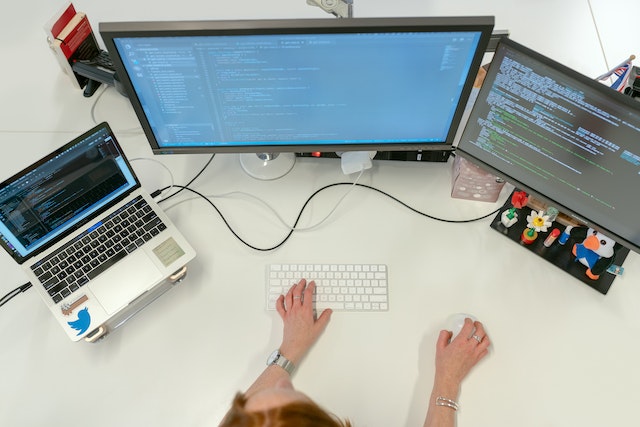Nearly every business needs software. Your business processes might rely on software to manage your finances and payroll, email marketing, and employee benefits. While many of us pay to leverage already-existing software, there are two approaches to this. While some businesses pay for it, other companies build software in-house!
How do these two approaches compare, and which one is best for your business requirements? Let’s discuss it.
Build vs Buy Software: What are the Key Differences?
Before we get into how to know whether you should create a custom solution or use existing software, let’s talk about the main differences between the two.

Buying Software
Your first option is paying for off-the-shelf software. This essentially means that it’s ready to go out of the box. While you might purchase some software solutions outright, many require you to pay a monthly subscription fee (or yearly).
The pros of buying software solutions are that it’s usually quicker, cheaper, and more efficient than building your own software.
However, it likely won’t be as customizable, and you won’t have as much control. You never really “own” the software or even the data you input.
Building Software In-House
Developing software certainly offers a few benefits. You have (nearly) complete control, can customize it to your needs, and can make it scale alongside your business needs. This can give you a real competitive advantage. And, if you build it properly, it can save you time and money down the line.
However, building software is neither quick nor easy. In fact, it can take years and cost a fortune, depending on the custom solution you’re trying to develop. You’ll need far more internal resources to successfully pull this off, and you’ll have to be more patient.

How Do You Know if You Should Build vs Buy Software?
So, how can you make the right call based on your business goals? Should you choose from existing solutions or bring custom software development in-house?
If you are…
- In a hurry
- On a tight budget
- Working with a lean team
… then buying software is probably going to be your best bet.
On the other hand, if you have…
- Ample time
- A big budget
- The manpower to build software and maintain it long-term
… then creating custom software might be a feasible solution!
One isn’t Better Than the Other
Creating custom software isn’t inherently better than purchasing software, and the same goes for the reverse.
Rather, ask yourself this: “With the time, money, and team we currently have, will purchasing software or creating new software better serve our business requirements?”
Because software development can be so costly and slow, the decision of whether you should build vs buy software might be very clear.

A Note About Building Software “In-House”
When I say “in-house,” this doesn’t necessarily mean that you need your own employees to manage your software development. You could outsource it to freelancers, contractors, or an agency.
This is one way to build your own software but cut down on costs since outsourcing is usually cheaper.
However, keep in mind that this could slow down your timeline. If you outsource it, that person probably has other clients they’re juggling. Also, you lose some degree of control when it’s not your employees managing the software development.
Words of Caution: Think Long-Term
Building custom software solutions is a marathon, not a sprint. It’s not just the initial creation — it’s the maintenance you’ll need to keep up with for however long you plan to utilize that custom software solution.
This means that you’ll need to continue paying a developer or engineer long-term.
On the flip side, if you’re paying for existing software, then that company has its own staff that manages the tool. Whenever you need something, you simply contact customer support.

Remember, Building it Should be an Investment, Not an Expense
Even though it can be more expensive to build software and maintain it in the long run, the goal is that ultimately, it brings you a return.
If your company’s software ends up saving you significant time, money, or resources, then the expense might be well worth it.
Here’s an example. Maybe you build a tool that allows you to automate tasks that you previously had a dozen employees spending much of their time on. This custom development thus allows you to either save money on payroll or have those employees work on more valuable tasks (or a combination of both).
If you’re diligent in tracking your work and can measure how much money you’ve spent versus the money you’ve saved and even earned, then you’ll know if it was a more financially savvy decision to build vs buy software!
Consider a Hybrid Approach
All this being said, there might be a good compromise: Do a little bit of both!
If you’re short on time, money, and manpower, look to existing solutions to meet your current business needs.
However, on the side, you can slowly start exploring the possibility of developing new software based on your business goals.
- Brainstorm what you need this software solution to do.
- Is this for internal use only, or is it customer-facing?
- How will you manage users, privacy, and security risks?
- Start talking to developers. Ask how they charge (hourly? monthly?) and what they charge. This will help you start to shape your budget.
The development process has many twists and turns. While you’re leaning on your off-the-shelf solution, you can start to think about what it might look like for an in-house team to create and maintain a new solution.
Use Prebuilt Solutions as Inspiration
If you’re going to build your own solution, you don’t have to reinvent the wheel. I’m going to assume you’re considering custom solutions because the available off-the-shelf solutions aren’t getting the job done.
If you think it’ll be better to build software that you own, to better align with your business strategy, then consider these questions:
- What do existing tools offer that you want to keep?
- What are off-the-shelf products missing that you want to incorporate?
- How can you better create such a solution to give you a competitive advantage?
Wrapping Up
So, should you build vs buy software? As we’ve discussed, it largely comes down to the time, money, and ongoing support available to you. You must also consider your long-term needs and goals.
The good news is that you don’t have to take a huge risk and go all in. Before you immediately drop tens of thousands of dollars (or more) on paying a development team and developing new software, leverage an existing off-the-shelf software while you consider all of your options.













